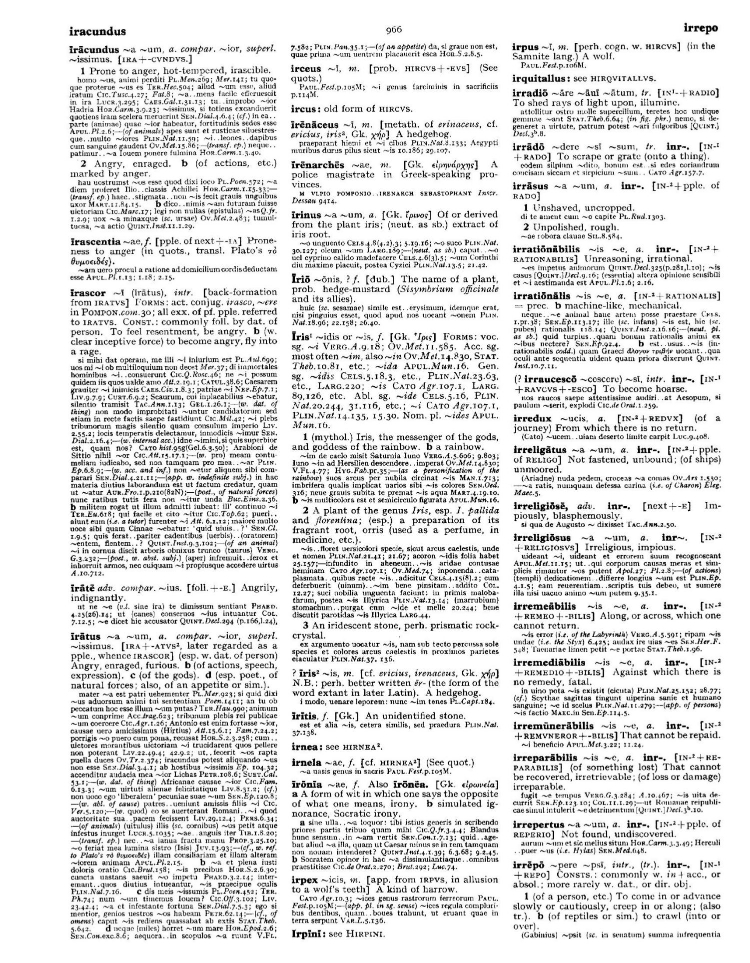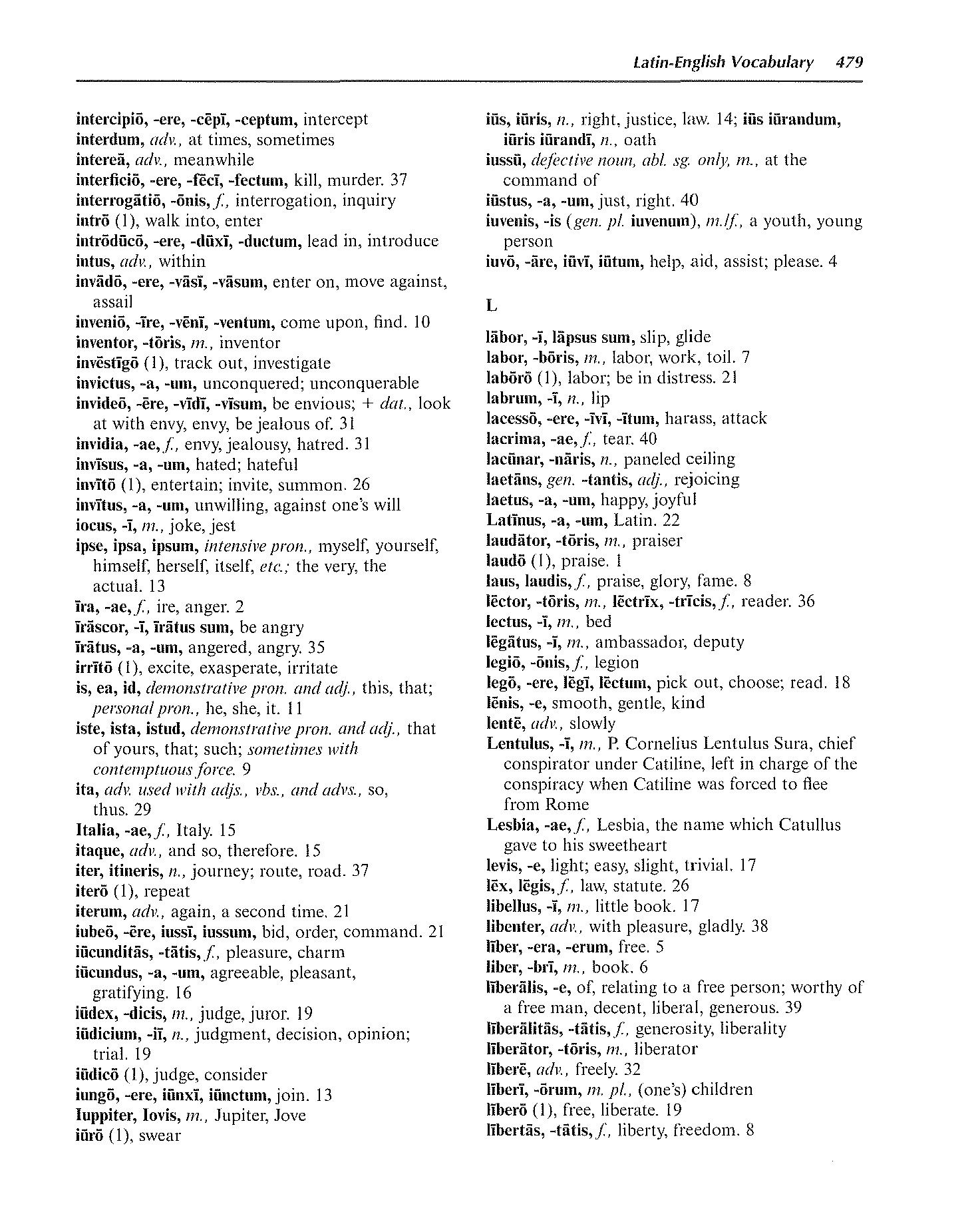
page_listing.tpl
page_subListingDetails.tpl
sub_listingDetails_style1.tpl
sub_listingDetails.title.tpl
īrāscī to be angry
īrāscī is a Latin Verb that primarily means to be angry.
Definitions for īrāscī
Wheelock's Latin
Verb
- 1
be angry
Oxford Latin Dictionary
Verb
- 1
To feel resentment, be angry. (b) (w. clear inceptive force) to become angry, fly into a rage.
Sentences with īrāscī
Latin to English
Orandum est ut sit mens sana in corpore sano; fortem posce animum mortis terrore carentem, qui spatium vitae extremum inter munera ponat naturae, qui ferre queat quoscumque labores, nesciat irasci, cupiat nihil et potiores Herculis aerumnas credat saevosque labores et venere et cenis et pluma Sardanapali.Compare We should pray for a sound mind in a sound body; for a heart that fears not death, deems mortality one of nature's gifts, can endure any kind of hard work, know no anger and covets naught, and thinks Hercules' labors and hardships better than love-making, banquets, or the soft couches of Sardanapalus.
Si tantum irasci vis sapientem, quantum scelerum indignitas exigit, non irascendum illi sed insaniendum est.Compare If you expect the wise man to be angry as the shamefulness of crime compels, he must not be angry merely, but go mad.
Quid irascor is qui aliquis scribo contra suus voluntas?Compare Why is he angry with one who has written something contrary to his own wishes?
Irascor vos quidem ego, pro res publica dicens, non oportet.Compare It will not behove you to be angry with me, for speaking in behalf of the commonwealth.
Conjugation table for īrāscī
Cactus2000
| ACTIVE | |
| Indicative present | Indicative imperfect |
| īrāscor īrāsceris īrāscitur īrāscimur īrāsciminī īrāscuntur | īrāscēbar īrāscēbāris īrāscēbātur īrāscēbāmur īrāscēbāminī īrāscēbantur |
| Indicative perfect | Indicative pluperfect |
| - - - - - - | - - - - - - |
| Indicative future | Indicative future perfect |
| īrāscar īrāscēris īrāscētur īrāscēmur īrāscēminī īrāscentur | - - - - - - |
| Subjunctive present | Subjunctive imperfect |
| īrāscar īrāscāris īrāscātur īrāscāmur īrāscāminī īrāscantur | īrāscerer īrāscerēris īrāscerētur īrāscerēmur īrāscerēminī īrāscerentur |
| Subjunctive perfect | Subjunctive pluperfect |
| - - - - - - | - - - - - - |
Infinitive present īrāscī Infinitive perfect - Infinitive future - | Imperative present īrāscere īrāsciminī Imperative future īrāscito / īrāscitor īrāscito / īrāscitor - īrāscunto / īrāscuntor |
| PARTICIPLE | ||
| Participle present active | ||
| īrāscēns | īrāscentēs | |
| īrāscēns | īrāscentēs | |
| īrāscēns | īrāscentēs | |
| īrāscēns | īrāscentēs | |
| īrāscēns | īrāscentēs | |
| Participle future active | ||
| - | - | |
| - | - | |
| - | - | |
| - | - | |
| - | - | |
| Participle perfect passive | ||
| - | - | |
| - | - | |
| - | - | |
| - | - | |
| - | - | |
| Gerundive | ||
| īrāscendus | īrāscendī | |
| īrāscendus | īrāscendī | |
| īrāscendus | īrāscendī | |
| īrāscendus | īrāscendī | |
| īrāscendus | īrāscendī | |
| Gerund | Supine | |
| īrāscī | - | |
| īrāscī | - | |
| īrāscī | ||
| īrāscī | ||
| īrāscī | ||
| PARTICIPLE | ||
| Participle present active | ||
| Nom. | īrāscēns | īrāscentēs |
| Gen. | īrāscentis | īrāscentium |
| Dat. | īrāscentī | īrāscentibus |
| Acc. | īrāscentem | īrāscentēs |
| Abl. | īrāscente | īrāscentibus |
| Participle future active | ||
| Nom. | - | - |
| Gen. | - | - |
| Dat. | - | - |
| Acc. | - | - |
| Abl. | - | - |
| Participle perfect passive | ||
| Nom. | - | - |
| Gen. | - | - |
| Dat. | - | - |
| Acc. | - | - |
| Abl. | - | - |
| Gerundive | ||
| Nom. | īrāscendus | īrāscendī |
| Gen. | īrāscendī | īrāscendōrum |
| Dat. | īrāscendō | īrāscendīs |
| Acc. | īrāscendum | īrāscendōs |
| Abl. | īrāscendō | īrāscendīs |
| Gerund | Supine | |
| Nom. | īrāscī | - |
| Gen. | īrāscendī | - |
| Dat. | īrāscendō | |
| Acc. | īrāscendum | |
| Abl. | īrāscendō | |
Data sources
Notes
- Definitions
- Frederick M. Wheelock, Wheelock's Latin, 6th ed., rev. Richard A. LaFleur (New York, NY: HarperCollins Publishers, 2005): 479.
- P. G. W. Glare, Oxford Latin Dictionary, Vols. 1-8 (Oxford: Clarendon Press, 1982): 966.
- Word frequencies
- Christopher Francese, "Latin Core Vocabulary," Dickinson College Commentaries, last modified 2014, http://dcc.dickinson.edu.
- Paul B. Diederich, The Frequency of Latin Words and Their Endings, PhD diss., (Columbia University, 1939).
- Louis Delatte, Suzanne Govaerts, Joseph Denooz, and Etienne Evrard, Dictionnaire fréquentiel et index inverse de la langue latine [Frequency Dictionary and Inverse Index of the Latin Language] (Liège, Belgium: Laboratoire d'analyse statistique des langues anciennes de l'Université de Liège [L.A.S.L.A.], 1981): 124.
Bibliography
Allen, Joseph H. Allen and Greenough's New Latin Grammar for Schools and Colleges: Founded on Comparative Grammar. Edited by James B. Greenough, George L. Kittredge, Albert A. Howard, and Benjamin L. D'Ooge. Boston, MA: Ginn & Company, 1903.
Crystal, David. A Dictionary of Linguistics and Phonetics. 6th ed. Oxford, UK: Blackwell Publishing, 2008.
Delatte, Louis, Suzanne Govaerts, Joseph Denooz, and Etienne Evrard. Dictionnaire fréquentiel et index inverse de la langue latine [Frequency Dictionary and Inverse Index of the Latin Language]. Liège, Belgium: Laboratoire d'analyse statistique des langues anciennes de l'Université de Liège (L.A.S.L.A.), 1981.
Diederich, Paul B. The Frequency of Latin Words and Their Endings. PhD diss., Columbia University, 1939.
Francese, Christopher. "Latin Core Vocabulary." Dickinson College Commentaries. Last modified 2014. http://dcc.dickinson.edu/latin-vocabulary-list.
Gildersleeve, Basil L., and Gonzales Lodge. Gildersleeve's Latin Grammar: Third Edition, Revised, and Enlarged. 3rd ed. London, England: Macmillan and Co., 1903.
Glare, Peter G.W. Oxford Latin Dictionary. Vols. 1-8. Oxford, England: Clarendon Press, 1982.
Krüger, Bernd. "Latin Conjugation Tables." Cactus2000. Accessed May 5, 2023. https://latin.cactus2000.de/index.en.php.
Pierson, Nick. "Sound of Text." Accessed October 26, 2019. https://soundoftext.com.
Wheelock, Frederick M. Wheelock's Latin. 6th ed. Revised by Richard A. LaFleur. New York, NY: HarperCollins Publishers, 2005.
Wiktionary Contributors. "Victionarium." Wikimedia Foundation, Inc. Updated March 18, 2019. https://la.wiktionary.org/wiki/Victionarium:Pagina_prima.
Citation
Chicago (17th ed.)
Allo Contributors. "īrāscor, īrāscī, īrātus sum (v.) - Latin Word Definition." Allo Latin Dictionary. Last modified . Accessed February 20, 2026. http://ancientlanguages.org/latin/dictionary/irascor-irasci-iratus-sum.
Entry created on . Last updated on .







